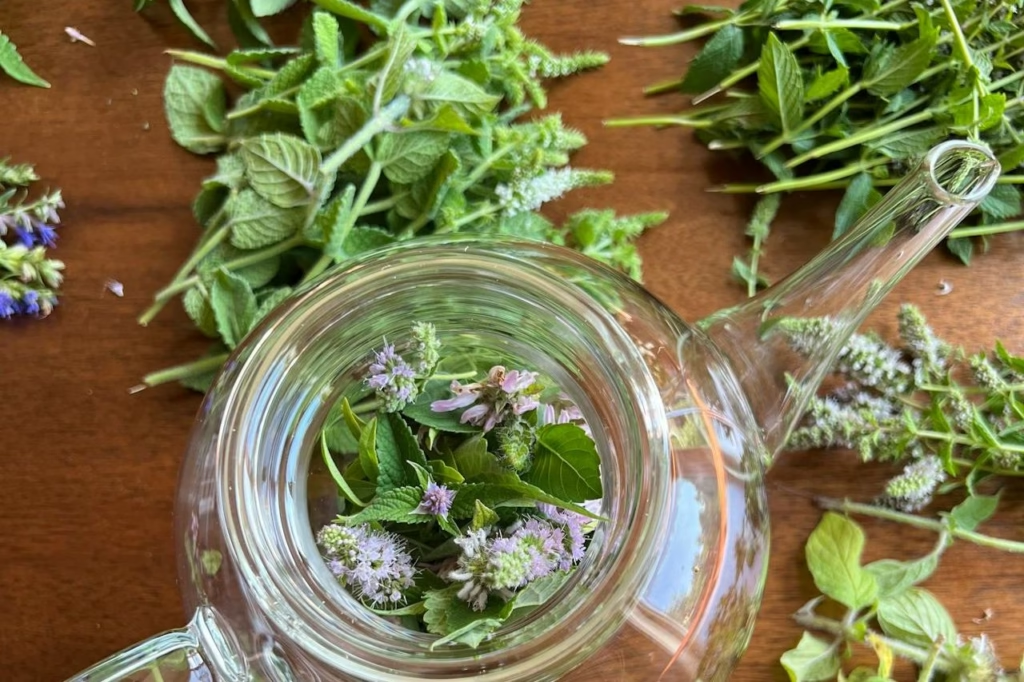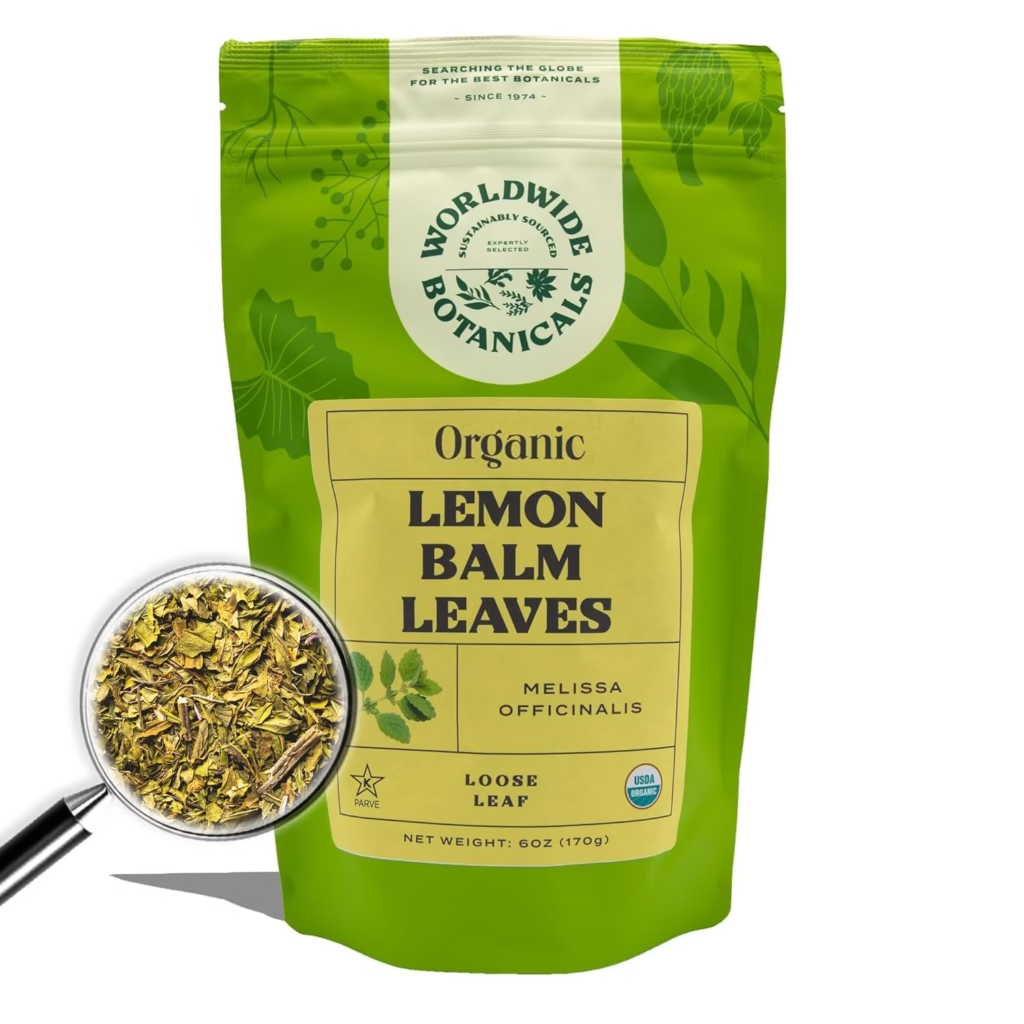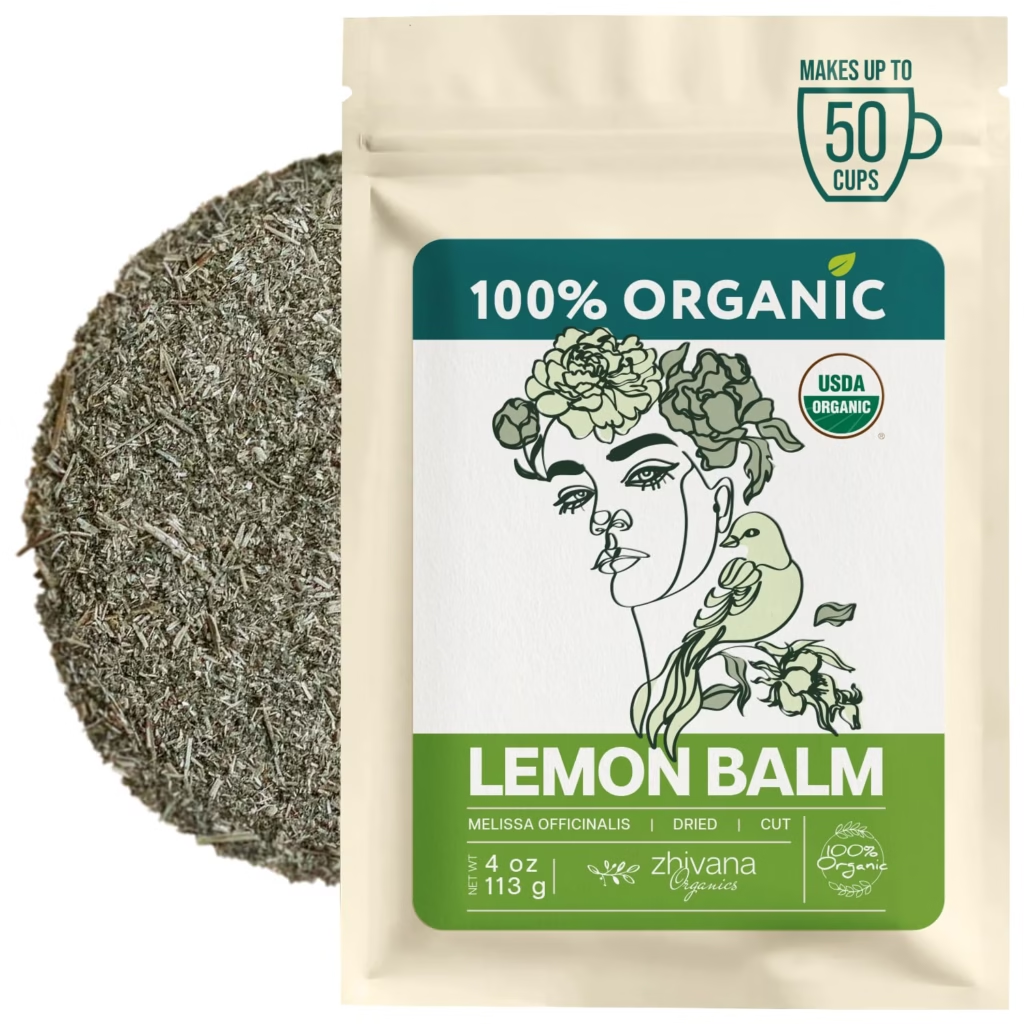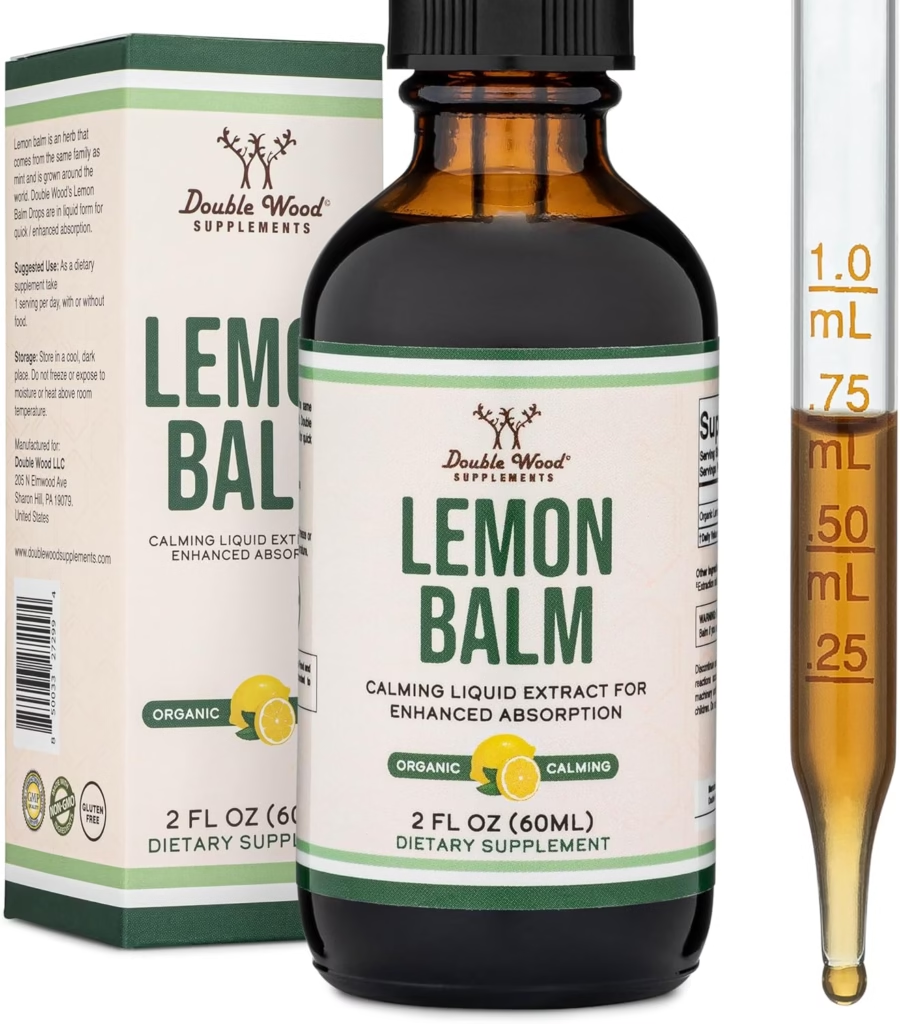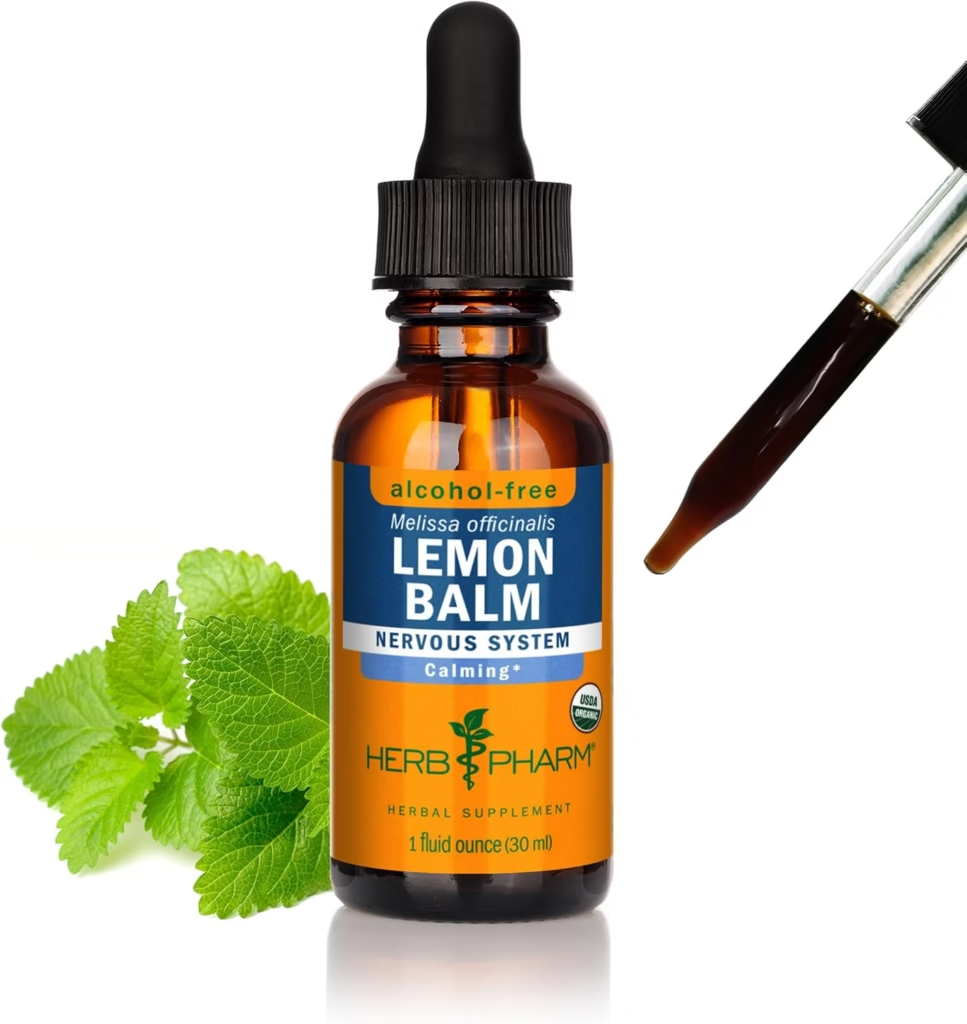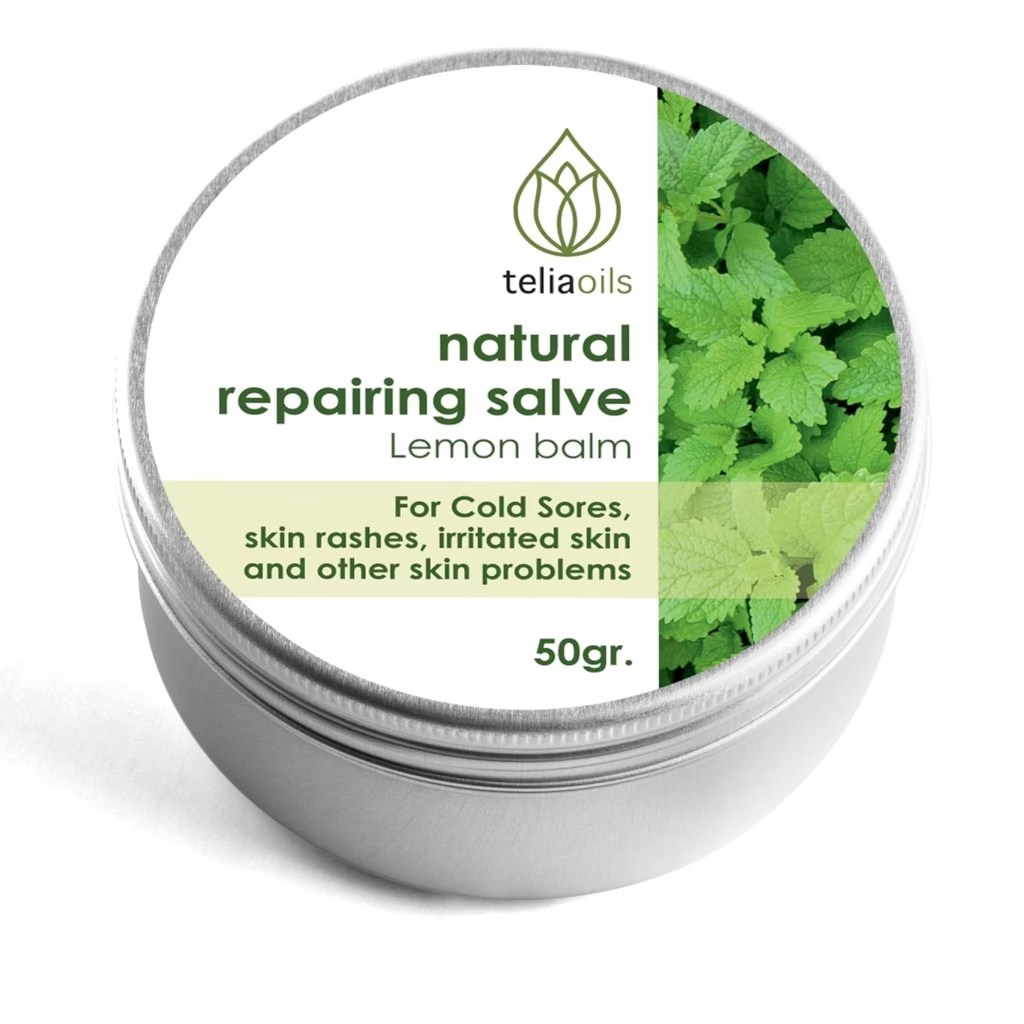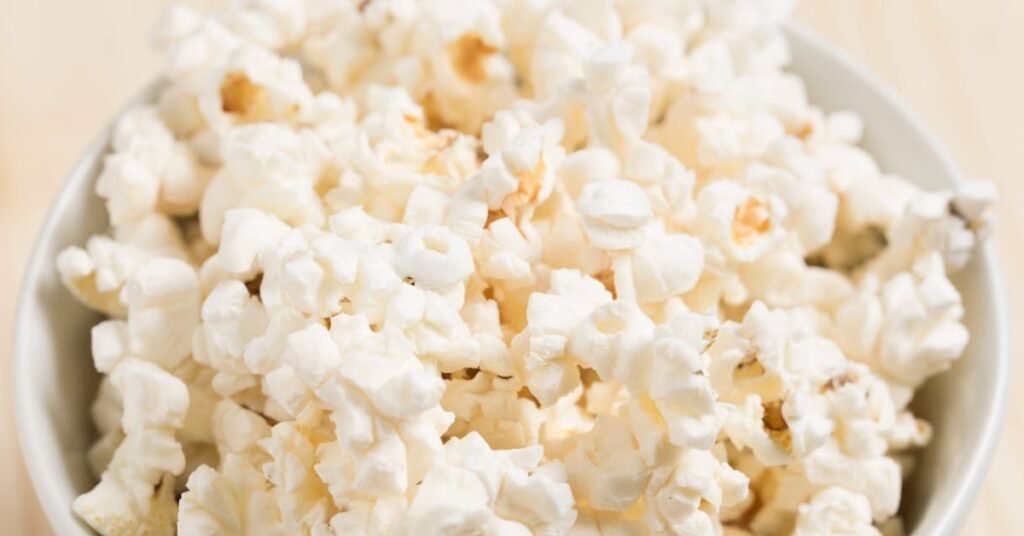I’ve been drinking lemon balm tea since childhood, not for weight loss, but because my grandma brewed it every night to help us sleep better. Recently, though, lemon balm has gained attention for more than just its calming smell. There are claims that it can help with digestion, stress, and that lemon balm is good for weight loss. So, is there truth behind the trend? And how to make lemon balm tea? Let’s dive into the science…
What Is Lemon Balm?
Lemon balm, or Melissa officinalis, is a plant from the mint family. It has a minty but slightly lemony scent ( hence the name). It has been used by herbalists for better sleep, a calming effect, as well as easing the digestion for centuries. Lemon balm is commonly used as a tea from leaves or as an essential oil in aromatherapy.
Before we break down the science and the benefits, let’s have a look at a list of beneficial bioactive compounds found in lemon balm.
Beneficial Compounds in Lemon Balm:
| Group | Compound | Health Benefits and Biological Activities |
|---|---|---|
| Essential Oils | Citral (Geranial & Neral) | Antimicrobial, anti-inflammatory, sedative, anxiolytic |
| Citronellal | Antibacterial, antifungal, calming | |
| Geraniol | Anti-inflammatory, antioxidant, antiviral, anxiolytic | |
| Linalool | Calming, anxiolytic, anticonvulsant | |
| Citronellol | Antibacterial, sedative | |
| Beta-caryophyllene | Anti-inflammatory, analgesic, anxiolytic | |
| Phenolic Acids | Rosmarinic Acid | Strong antioxidant, anti-inflammatory, antiviral, anxiolytic, neuroprotective, digestive aid, antispasmodic |
| & Polyphenols | Caffeic Acid | Antioxidant, anti-inflammatory, antiviral, hepatoprotective |
| Chlorogenic Acid | Antioxidant, anti-inflammatory, metabolic support | |
| Flavonoids | Luteolin | Antioxidant, anti-inflammatory, anxiolytic, neuroprotective |
| Quercetin | Potent antioxidant, anti-inflammatory, antihistamine, cardiovascular protective | |
| Apigenin | Sedative, anxiolytic, antioxidant, anti-inflammatory, anticancer potential | |
| Triterpenoids | Ursolic Acid | Anti-inflammatory, antimicrobial, hepatoprotective, anti-obesity, anti-angiogenic |
| Oleanolic Acid | Anti-inflammatory, hepatoprotective, antiviral, anti-obesity | |
| Tannins | Condensed & Hydrolysable Tannins | Astringent, antioxidant, antiviral, anti-inflammatory, digestive health |
Lemon balm has an amazing array of antioxidants, as well as antimicrobial and anti-inflammatory compounds. Let’s have a look at whether there are any scientific studies showing the benefits of lemon balm.
What are the proven benefits of lemon Balm?
Anxiety and Stress Relief
In some small studies, a dose of 600mg of lemon balm extract was shown to reduce anxiety by 18% (1). Even a dose of 300 mg had similar effects on mood improvement and cognitive performance under stress (2). Human studies show that lemon balm tea extract and essential oil can produce modest reductions in anxiety, nervousness, and stress. The higher dose of lemon balm (1600mg) was shown to increase calmness and improve memory tasks up to six hours after supplementation. (3).
Users often report feeling calmer and less tense; however, many of the studies are funded by companies producing lemon balm products, therefore, we need to look at the results with a bit of caution.
Improved Sleep Quality
Although lemon balm has not been studied as a stand-alone sleep aid, it shows some promise, especially if you are stressed or anxious. There are no studies of lemon balm focusing specifically on sleep, but the studies that target anxiety and stress have noted improved sleep as well. (1)
Cognitive Function and Mood
I have always thought of lemon balm as a remedy helping to relax, so I was surprised to learn that higher doses of lemon balm ( 1600mg) can improve cognitive function by enhancing memory and alertness. (4) A small study of 42 Alzheimer’s patients had cognitive improvements and a reduction in aggregation compared to a placebo group. (5) The effects were mild compared to medication, but show promise for being used in parallel to other treatments.
Digestive Health Improvements
When I was diagnosed with IBS, my GP prescribed me some peppermint oil tablets to help with flare-ups. Although I am no longer suffering from IBS anymore ( thanks to a plant-based diet), I do remember that peppermint oil was the only medicine that would calm down my flares. Lemon balm is from the mint family, as well as peppermint, so I was not surprised to learn that it can also help with digestive issues, including IBS.
2 different studies showed a decrease in IBS and PMS cramps and bloating when using lemon balm and other carminative herbs like anise. (6)(7)
Cardiovascular and Metabolic Health
Although we need more studies on this, a recent meta-analysis of 5 clinical trials found that lemon balm supplementation led to a significant reduction in triglycerides, total cholesterol, and LDL cholesterol levels compared to placebo in a total of 302 participants (8). Lemon balm could potentially reduce blood pressure and increase heart health by reducing stress, but we need studies to prove this.
Antiviral and antibacterial potential
Due to its essential oils and polyphenols, lemon balm can be applied as a cream on cold sores to speed up the healing process and prevent spreading.(9)(10)
Anti-Inflammatory and Antioxidant Effects
Due to being rich in antioxidants, lemon balm could potentially lower inflammation. Lemon balm supplementation reduced oxidative stress markers in one study(7), but like with most herbal remedies, we need more studies to be sure.
What about Lemon balm for weight loss?
As much as there are a lot of claims that lemon balm is a natural Ozempic, the science is not quite there yet to prove it.
There have not been any human trials focusing on lemon balm for weight loss, and the ones focusing on stress or sleep only lasted for a few weeks and did not note any weight changes in the participants.
There are some promising results in animal studies (11) showing that lemon balm could aid weight loss. Roden studies highlight the anti-obesity effect of lemon balm. In high-fat diets, lemon balm usage results in lower weight gain, less body fat, and healthier metabolism(12).
In Vitro, lemon balm acts on fat cells and metabolic pathways to discourage fat buildup and improve fat burning(13)(14).
But animal and in vitro results don’t always translate to humans, so conclusions should be cautious.
As mentioned before, lemon balm is proven to aid sleep and stress that could impact your weight, so it could still be beneficial for your waistline, but if you are taking lemon balm for weight loss specifically, although animal and in vitro studies show promise, no human studies are proving it’s weight loss capabilities as yet.
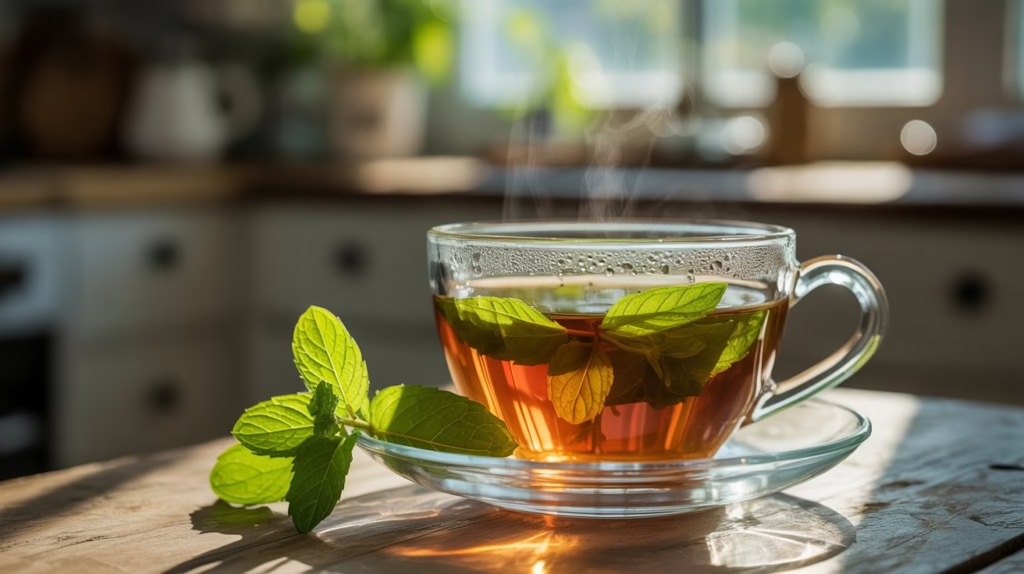
How to make lemon balm tea
To make a lemon balm tea, you will need fresh or dried leaves and hot, but not boiling water.
Fresh lemon balm leaves will be more aromatic, but you will have a milder medical effect as you will need more of them. Dried leaves will be more potent and will have a more intense flavour. I would recommend using loose leaves to prevent microplastics in tea bags.
The Best Water Temperature for Lemon Balm Tea is around 85–90°C (185–195°F). It is slightly below boiling temperature to prevent bitter compounds from being released, and keep the flavor smooth and therapeutic compounds undamaged.
Always cover while steeping to trap oils and active compounds. Fresh leaves: Steep 5–10 minutes.Dried leaves: Steep 5–8 minutes.
You can enjoy lemon balm tea on its own or add more ingredients to enhance its benefits.
To enhance Lemon Balm Tea Benefits, Add:
- Ginger: Boosts digestive and anti-inflammatory properties.
- Lemon: Adds vitamin C, an antioxidant, and immune-enhancing benefits.
- Chamomile: Improves calming effects and promotes deeper sleep.
- Mint: Supports digestion, enhances refreshing taste.
- Turmeric: Adds potent anti-inflammatory and antioxidant effects.
If you like your tea sweet, add a bit of honey or maple syrup.
You should drink 2 to 3 cups of lemon tea a day to feel the best benefits.
Where to buy Lemon balm?
To make sure you consume good-quality lemon balm, I would recommend buying it from reputable sources or brands.
If you are looking for good-quality lemon balm tea, make sure you buy loose, organic leaves, or if you insist on tea bags, make sure you buy ones that are made without polypropylene to avoid microplastics.
Lemon Balm Teas
Worldwide Botanicals Organic Lemon Balm Tea Leaves
– Organic & sustainably harvested ingredients
– Pure, unadulterated botanicals
– No artificial flavors, MSG, or preservatives
Zhivana Lemon Balm Tea Organic – Lemon Balm Herb Loose Leaf
A small family business based in New York with production facilities based in Ukraine that will appreciate your support.
Lemon Balm Oils
Double Wood Supplements Lemon Balm Tincture – Organic Lemon Balm Drops
Lemon Balm herbal drops can be taken on their own or added to water, they are also great to improve the effectiveness of Lemon Balm Tea.
Herb Pharm Certified Organic Lemon Balm Liquid Extract
Prepared from the shade-dried herb of Melissa officinalis plants, which are Certified Organically grown on Herb Pharm’s farm.
Lemon Balm Salve
Teliaoils Lemon Balm Salve, Fast Acting/Natural Salve
Lemon balm is a unique alternative that contains tea tree, peppermint, myrrh, and lavender oils that have natural properties to ease symptoms caused by cold sores, itching, or other skin conditions.
The conclusion:
I have thoroughly enjoyed writing this article about a herb I have loved since I was a kid. It was a reminder to brew lemon balm tea to help me with focus and with writing process.
While lemon balm has many traditional and emerging uses, most of its weight loss claims remain unproven in human studies. Still, for stress and sleep, it offers a gentle, natural option worth trying
Have you tried lemon balm tea? Do you have a favourite recipe you would like to share? Or maybe you love using lemon balm essential oil? Let me know in the comments section.
Please note: This post is for informational purposes only and is based on research. It’s not medical advice. It’s always best to consult a healthcare professional with health concerns. Enjoy your cuppa!
References
- Cases J, Ibarra A, Feuillère N, Roller M, Sukkar SG. Pilot trial of Melissa officinalis L. leaf extract in the treatment of volunteers suffering from mild-to-moderate anxiety disorders and sleep disturbances. Med J Nutrition Metab. 2011 Dec;4(3):211-218. doi: 10.1007/s12349-010-0045-4. Epub 2010 Dec 17. PMID: 22207903; PMCID: PMC3230760.https://pmc.ncbi.nlm.nih.gov/articles/PMC3230760/
- Scholey A, Gibbs A, Neale C, Perry N, Ossoukhova A, Bilog V, Kras M, Scholz C, Sass M, Buchwald-Werner S. Anti-stress effects of lemon balm-containing foods. Nutrients. 2014 Oct 30;6(11):4805-21. doi: 10.3390/nu6114805. PMID: 25360512; PMCID: PMC4245564.https://pmc.ncbi.nlm.nih.gov/articles/PMC4245564/
- Kennedy DO, Wake G, Savelev S, Tildesley NT, Perry EK, Wesnes KA, Scholey AB. Modulation of mood and cognitive performance following acute administration of single doses of Melissa officinalis (Lemon balm) with human CNS nicotinic and muscarinic receptor-binding properties. Neuropsychopharmacology. 2003 Oct;28(10):1871-81. doi: 10.1038/sj.npp.1300230. PMID: 12888775.https://pubmed.ncbi.nlm.nih.gov/12888775/#
- Kennedy DO, Wake G, Savelev S, Tildesley NT, Perry EK, Wesnes KA, Scholey AB. Modulation of mood and cognitive performance following acute administration of single doses of Melissa officinalis (Lemon balm) with human CNS nicotinic and muscarinic receptor-binding properties. Neuropsychopharmacology. 2003 Oct;28(10):1871-81. doi: 10.1038/sj.npp.1300230. PMID: 12888775.https://pubmed.ncbi.nlm.nih.gov/12888775/
- Akhondzadeh S, Noroozian M, Mohammadi M, Ohadinia S, Jamshidi AH, Khani M. Melissa officinalis extract in the treatment of patients with mild to moderate Alzheimer’s disease: a double blind, randomised, placebo controlled trial. J Neurol Neurosurg Psychiatry. 2003 Jul;74(7):863-6. doi: 10.1136/jnnp.74.7.863. PMID: 12810768; PMCID: PMC1738567.https://pmc.ncbi.nlm.nih.gov/articles/PMC1738567/
- Maryam Azimi, Hossein Karimi Dokht Shahrbabaki, Mahboobeh Raeiszadeh, Fatemeh Alijani, Omid Eslami,Efficacy of Melissa officinalis, Pimpinella anisum, and Rosa damascena formula in irritable bowel syndrome: A double-blind, randomized trial, Advances in Integrative Medicine,2024,ISSN 2212-9588, https://doi.org/10.1016/j.aimed.2024.12.006.
- Mathews IM, Eastwood J, Lamport DJ, Cozannet RL, Fanca-Berthon P, Williams CM. Clinical Efficacy and Tolerability of Lemon Balm (Melissa officinalis L.) in Psychological Well-Being: A Review. Nutrients. 2024 Oct 18;16(20):3545. doi: 10.3390/nu16203545. PMID: 39458539; PMCID: PMC11510126.https://pmc.ncbi.nlm.nih.gov/articles/PMC11510126/
- Shahsavari, K., Shams Ardekani, M.R., Khanavi, M. et al. Effects of Melissa officinalis (lemon balm) consumption on serum lipid profile: a meta-analysis of randomized controlled trials. BMC Complement Med Ther 24, 146 (2024). https://doi.org/10.1186/s12906-024-04442-0
- https://www.mountsinai.org/health-library/herb/lemon-balm#:~:text=Some%20studies%20suggest%20that%20topical,study%20of%20116%20people
- Chang JY, Balch C, Puccio J, Oh HS. A Narrative Review of Alternative Symptomatic Treatments for Herpes Simplex Virus. Viruses. 2023 Jun 2;15(6):1314. doi: 10.3390/v15061314. PMID: 37376614; PMCID: PMC10301284.https://pmc.ncbi.nlm.nih.gov/articles/PMC10301284/
- Lee D, Shin Y, Jang J, Park Y, Ahn J, Jeong S, Shin SS, Yoon M. The herbal extract ALS-L1023 from Melissa officinalis alleviates visceral obesity and insulin resistance in obese female C57BL/6J mice. J Ethnopharmacol. 2020 May 10;253:112646. doi: 10.1016/j.jep.2020.112646. Epub 2020 Feb 3. PMID: 32027997. https://pubmed.ncbi.nlm.nih.gov/32027997/
- Kim JG, Park J, Baek S, Won S, Cho J. Effects of Melissa officinalis Extracts on Obesity and Anxiety. Clin Nutr Res. 2025 Jan 31;14(1):65-77. doi: 10.7762/cnr.2025.14.1.65. PMC11832291.https://pmc.ncbi.nlm.nih.gov/articles/PMC11832291/
- Woo S, Yoon M, Kim J, Hong Y, Kim MY, Shin SS, Yoon M. The anti-angiogenic herbal extract from Melissa officinalis inhibits adipogenesis in 3T3-L1 adipocytes and suppresses adipocyte hypertrophy in high fat diet-induced obese C57BL/6J mice. J Ethnopharmacol. 2016 Feb 3;178:238-50. doi: 10.1016/j.jep.2015.12.015. Epub 2015 Dec 15. PMID: 26702505. https://pubmed.ncbi.nlm.nih.gov/26702505/
- https://www.researchgate.net/publication/262880428_In_vitro_anti-diabetic_effect_and_chemical_component_analysis_of_29_essential_oils_products
Silvija Meilunaite, PN1-NC, CSMC, is a certified nutrition and menopause coaching specialist who writes about midlife health, nutrition, and evidence-based wellness. She focuses on research-driven approaches to feeling better in your 40s and beyond, with a special interest in low-tox living and supportive daily habits.
- This author does not have any more posts.

